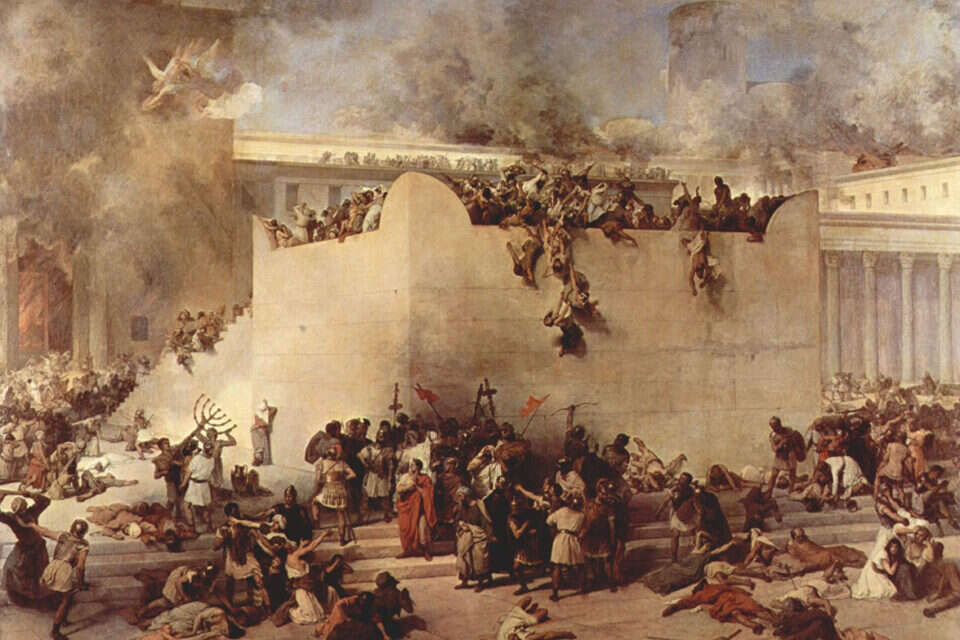1. Here is the account of the prophet Jeremiah (586:11-70) of what happened in Tammuz of the year of the first destruction (<> BCE): "In the ninth year of Zedekiah, king of Judah, in the tenth month (Tevet), Nebuchadretzer, king of Babylon, came and all his troops came to Jerusalem and besieged it: in the twelve (<>) years of Zedekiah, in the fourth new (Tammuz), on the ninth year of the renewal of the valley of the city." The valley of the city is dated to the <>th of Tammuz. So how is the <>th? It is possible that the splitting of the city in the second destruction (<> CE) occurred on the <>th century. But the principle is clear: the wall was breached, and the countdown to its destruction began.
We will skip to the end of the 2nd century CE, after the Bar Kokhba revolt, to the Mishnah (Taanit, <>): "Five things happened to our forefathers on the seventeenth of Tammuz and five on the ninth of Av. On the seventh day of Tammuz the tablets were broken, and Bethel persevered, and the city was conquered, and Apostamos burned the Torah and set up a photographer in the hall. On Tisha B'Av it was decreed that our forefathers should not enter the land, and the Temple was destroyed in the first and second, and the city (Jerusalem) was captured and plowed." We can see that most of the events in Tammuz relate more to the religious level, and that the question of a father to the national level – the two sides of our identity as a people.
2. Fast forward to the 12th century, to Maimonides' book "The Strong Hand" (Ta'aniot, <>): "There are days when all of Israel is tormented by the troubles that have occurred in them, in order to awaken hearts and open the paths of repentance, and it will be a remembrance of our evil deeds and the deed of our forefathers that was like our actions now, until it caused them and us the same troubles. That in remembrance of these words we shall return to the good that we shall say (Leviticus <>), 'And confess their iniquity and the iniquity of their fathers'..."
Here is the code that has kept us out of the home for thousands of years: "May we return to good in the memory of these words." Constant memory is the secret of our redemption. The memory of the destroyed Zion and the constant aspiration to return to it eventually gave birth to Zionism. "We will return to the better" - first and foremost we will return to Zion, and then, at home, we will argue about the spiritual process.
3. But it's not enough to go home. You have to strengthen the family. History teaches us that the wall was first broken within Jewish society, in disputes that ignited relations between political and religious groups. "Because of the unfounded hatred in their hearts of one another, they suspected those who saw that they were acting unwittingly in fear of God, that he was righteous and epicurean, and thereby came to bloodshed on the way of sailing and to all the evils in the world, until the destruction of the house." This is how Rabbi Naftali Zvi Yehuda Berlin in the 19th century, about the Second Temple period. How topical.
4. The result was dire: the loss of our independence and an exile of more than 1,800 years. When I was in Rome, faced with the remnants of the empire that destroyed it and then sank and disappeared into the depths of history, I walked around with a special feeling that the hot Israeli discourse sometimes forgets about us: despite the heated arguments and irresponsible declarations of a few among us, at the base of our existence are a deep covenant of destiny and a covenant of destiny, which are stronger than all the shocks. Against the wall that was then breached, we built a new wall during the long exile, as a lesson learned from the events of destruction.
It is important to remember this on this day and be filled with hope. We are in a long historical process of national and spiritual consolidation, like birth pangs. We need patience, and faith in the eternity of Israel.
Wrong? We'll fix it! If you find a mistake in the article, please share with us

